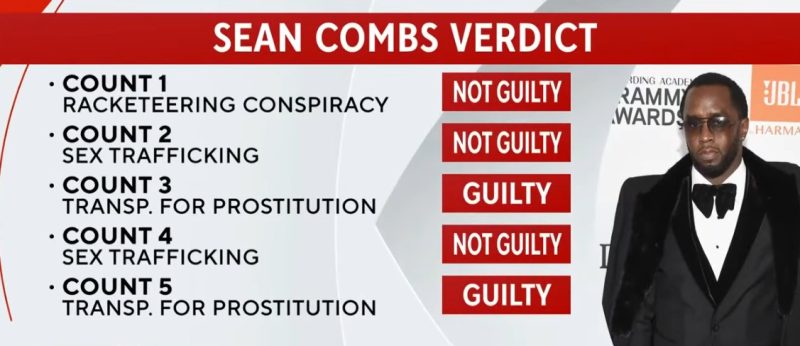Watch the LIVE PRESS CONFERENCE HERE – Coming up on the Live Stream

On a humid July morning in Manhattan, the jury’s decision in Sean “Diddy” Combs’ high-profile federal trial landed with the force of a cultural earthquake.

After weeks of testimony that peeled back the layers of celebrity, power, and abuse, the 12-member panel found Combs guilty on two counts of transporting women for prostitution under the Mann Act, but acquitted him of the most serious charges: racketeering and sex trafficking. The split verdict leaves the music mogul facing a possible 20-year sentence, but spares him the life-in-prison fate that once loomed over the proceedings.
A Courtroom Scene Charged with Emotion
As the verdict was read, Combs dropped to his knees, head bowed in prayer, while his family erupted in applause behind him. The moment was raw, unscripted, and almost cinematic—a man who has spent decades curating his public image suddenly stripped of control, surrounded by the people who know him best. His defense team, visibly relieved, exchanged hugs, while Combs clung to his lead attorney, Brian Steel. The prosecution, meanwhile, wasted no time: they urged the judge to keep Combs in custody until sentencing, arguing that the convictions still represent a danger to the public and the women involved. The judge, Arun Subramanian, gave both sides a few hours to make their cases before deciding whether Combs would be released on bond or remain behind bars until his fate is sealed.
The Charges: What Stuck, What Didn’t
The government’s case against Combs was sprawling, built on the testimony of 34 witnesses over six weeks. The most harrowing accounts came from Cassie Ventura, Combs’ former girlfriend, and another woman identified only as “Jane.” Both described years of manipulation, violence, and coerced participation in what prosecutors called “freak offs”—drug-fueled sexual encounters with escorts, sometimes filmed, always orchestrated by Combs. The prosecution painted a picture of a man who used his business empire as a front for a criminal enterprise, leveraging his power to coerce and control.
But the jury, after 13 hours of deliberation, drew a line. They found Combs guilty of transporting both Ventura and Jane across state lines for prostitution, but acquitted him of racketeering and sex trafficking. The distinction is more than legal hair-splitting. The racketeering and sex trafficking charges carried mandatory minimums and the specter of life in prison. The Mann Act convictions, while serious, are less severe—though still enough to put Combs behind bars for up to 20 years.
The Testimony: Fame, Power, and the Cost of Silence
The trial was a parade of familiar and unfamiliar faces. Cassie Ventura’s testimony was especially wrenching—four days on the stand, pregnant, describing a relationship that veered from glamorous to terrifying. She spoke of being forced into sexual situations she didn’t want, of physical abuse, and of a sense of powerlessness that belied her public persona. Rapper Kid Cudi, who once dated Ventura, testified about the toxic dynamic he witnessed. A former assistant, “Mia,” described cleaning up after “hotel nights” and enduring her own assaults.
The defense, for its part, didn’t call a single witness. Their strategy was to argue that the sexual activity was consensual, that the government was overreaching, and that Combs’ “freak off” parties were a matter of private vice, not public crime. The jury’s verdict suggests they found some merit in both arguments—rejecting the most sweeping claims of criminal enterprise, but unwilling to let Combs off the hook entirely.
What Happens Next: Sentencing, Legacy, and the Industry’s Reckoning
Combs’ legal team is pushing for his release on bond, pointing to the acquittals on the most serious charges. Prosecutors are seeking the maximum sentence, arguing that the convictions still represent a grave abuse of power. The judge’s decision on bail—and the eventual sentence—will be closely watched, not just by Combs’ fans and detractors, but by an industry that has long struggled with questions of accountability and abuse.
The verdict is already rippling through the music world. For decades, Combs has been a symbol of hip-hop’s ascent, a man who turned street hustle into global influence. Now, he stands as a cautionary tale—a reminder that power, unchecked, can curdle into something much darker. The trial forced uncomfortable conversations about complicity, silence, and the price paid by those who orbit the powerful.
A Final Word: No Easy Endings
There’s a temptation, in moments like this, to look for closure. But the truth is messier. For the women who testified, the verdict is both vindication and a reminder of what was lost. For Combs, it’s a fall from grace, but not total ruin. For the industry, it’s another reckoning, another chance to ask hard questions about who gets protected, and who gets hurt.
The story isn’t over. Sentencing awaits. So do the reckonings—personal, professional, and cultural—that always follow when the powerful are finally called to account.
